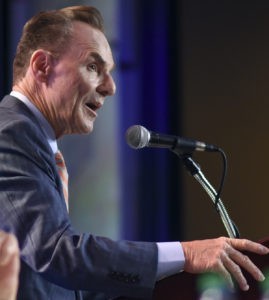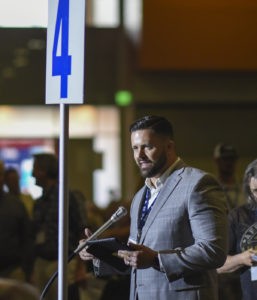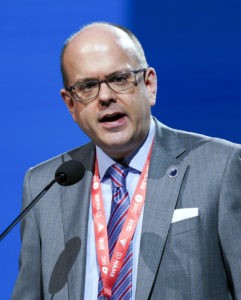In a rare and sharp rebuke of its top staff leader, the Southern Baptist Convention on Wednesday, June 16, said the SBC Executive Committee cannot investigate itself as its president, Ronnie Floyd, had attempted to do.
Floyd, who has been embattled since leaked letters from another denominational official surfaced portraying him as blocking attempts to address reports of sexual abuse in the denomination, stood as the representative figure of the Executive Committee, an 86-member board that handles the inner workings of the denomination.
The past chairman of the Executive Committee, Georgia pastor Mike Stone, also was singled out for critique in the letters leaked from Russell Moore, who recently resigned as head of the SBC Ethics and Religious Liberty Commission. As committee chair, Stone had led a controversial investigation of Moore and the ERLC. Messengers this year also rejected Stone as a candidate for SBC president, despite an orchestrated campaign on his behalf by the Conservative Baptist Network.

Ronnie Floyd (Baptist Press)
The question of how the SBC has or has not responded to serious allegations of sexual abuse by pastors and other leaders in SBC churches and institutions loomed large over this year’s annual meeting in Nashville. The meeting drew 21,474 registered attendees, including 15,726 “messengers,” as voting members are called. That was the largest crowd to attend an SBC annual meeting in 25 years, and the increased interest was driven by concerns about sexual abuse, about overreach by the Executive Committee and about the denomination’s future direction.
Stone and his allies in the Conservative Baptist Network portrayed the denomination as sliding once again into liberalism and in need of a second “conservative resurgence.” They also have been supportive of attempts to consolidate power within the Executive Committee.

Mike Stone (Baptist Press)
Messengers to this year’s meeting turned back every effort to consolidate more power in the Executive Committee — including passing a resolution that said the Executive Committee is not the “sole member” of the corporations of the various SBC agencies and institutions and therefore cannot overrule actions by trustees of those entities. That “sole member” right is reserved for the convention in annual session alone.
Messengers also rejected a new business and financial plan proposed by Floyd and the Executive Committee — a plan so unpopular that it was publicly opposed by the presidents of the six SBC seminaries.
Who manages the investigation?
All that pales in comparison, however, to the battle over who gets to investigate the Executive Committee over the allegations surfaced by Russell Moore and others.
Knowing an attempt would be made at the convention to call for an investigation, Floyd and the Executive Committee leadership took the unusual step Friday, June 11, of announcing they had hired an outside firm to investigate themselves and that the firm would report its finding back to them, not to the convention.
That news did not settle well with rank-and-file Southern Baptists represented at the convention.

Grant Gaines speaking for his motion to wrest control of a sexual abuse investigation from the SBC Executive Committee. (Baptist Press)
Grant Gaines, senior pastor of Belle Air Baptist Church in Murfreesboro, Tenn., attempted to force a workaround to this problem by making a motion on Tuesday, June 15, that would require the newly elected SBC president to appoint a task force to manage the outside audit of the Executive Committee and report back to the convention, not to the Executive Committee. The task force mandate would be to examine “any allegations of abuse, mishandling of abuse, mistreatment of victims, a pattern of intimidation of victims or advocates, and resistance to sexual abuse reform initiatives.”
The next day, the SBC Committee on Order of Business, which processes all motions made from the floor, attempted to refer the Gaines motion back to the Executive Committee and not let messengers vote on it.
While that move might appear curious to outsiders, it follows a longstanding pattern of the Committee on Order of Business, which routinely refers to various SBC agencies and institutions motions made about their internal workings. The idea is that the convention-elected boards of trustees are capable of managing such oversight on their own.
In this case, however, the accusations are that the Executive Committee has failed to manage its own affairs properly and needs to be reviewed from outside the organization. Thus when the Committee on Order of Business said it would refer the call for an investigation to the very body needing to be investigated, messengers to the convention revolted.
The effort to refer the motion rather than vote on it

Adam Greenway (Baptist Press)
When on Wednesday morning, June 16, the chairman of the Committee on Order of Business, Adam Greenway, listed the Gaines motion among a number of motions being referred to various entities, Gaines went to a microphone and declared to messengers his dismay over this ruling.
“Brothers and sisters, serious allegations have been made against our Executive Committee on matters related to sexual abuse,” he said. “And these allegations are not just coming from a former entity president. Even more significantly than that, these allegations are coming from several church sexual abuse survivors who experienced abuse within our Southern Baptist churches and who have alleged that they brought their cases to the Executive Committee, and the Credentials Committee, only to feel that they were brushed off, disregarded and turned away.
“These are not the kind of allegations we can sweep under the rug,” he continued. “These are horrific allegations that we must get to the bottom of and that we must investigate in a thorough and in an unbiased manner.”
The Executive Committee investigating itself is not good enough, Gaines said. “In order for this investigation to be truly external, independent, and unbiased, then we can’t have the Executive Committee setting the terms of the investigation themselves. They can’t be the ones to hold themselves accountable for cooperating with the firm of this investigation and they can’t report the findings themselves. It is very simple. Since they are the ones being investigated, they can’t be the ones in control of the investigation.”
“It is very simple. Since they are the ones being investigated, they can’t be the ones in control of the investigation.”
Gaines — apparently believing he had no further recourse — publicly appealed to Rolland Slade, current chairman of the Executive Committee, “to prioritize this, to not even wait until your next meeting of the Executive Committee in September, to call a special called meeting as soon as you possibly can, preferably before you leave Nashville.”
A short time later, an unidentified messenger went to a microphone and asked if it would be possible for the convention in session to overrule the referral of the Committee on Order of Business regarding the Gaines motion. The chair said yes, if a two-thirds majority of messengers voted to do so.
The motion was made, and SBC President J.D. Greear, who was presiding, rapidly took a show-of-ballots vote on the motion to overrule the committee’s referral. A visual scan of the room showed well more than the two-thirds majority needed.
Greenway then announced that consideration of the Gaines motion would be scheduled for that afternoon.
Debate time arrives
When Wednesday afternoon’s debate time arrived, Floyd was given a chance to respond to the motion. He spoke only five sentences: “I want all of you to know, I hear you. The Executive Committee respects the messengers. We need this deliberative process. We know that this will make our convention stronger. And that is what I want.”
He neither opposed nor endorsed the Gaines motion.
Other messengers rose to speak for and against the motion, including Troy Bush of Tucker Ga., who serves a church that has been scarred by allegations of abuse by a former staff member — a situation he said the Executive Committee knew about and chose to ignore.
“I demand to know the whole truth regardless of what idols must tumble to dust.”
“Because the Executive Committee did not follow through and do what we would consider the minimum level of inquiry … we believe the Executive Committee does not have the ability to handle this task force and investigation alone,” he said.
Brent Epling of Charleston, W.Va., made a fiery speech endorsing the motion: “How can we expect any vision of ours to be successful if we will not deal with our own sins? … I demand to know the whole truth regardless of what idols must crumble to dust.”
After a period of debate, messengers overwhelmingly approved the Gaines motion, which will wrest control of the already announced investigation from the Executive Committee and put it in the hands of a task force to be named by new SBC President Ed Litton.
Fate of other motions
While the attempt to refer the Gaines motion notably got overruled by messengers, the recommendation of the Committee on Order of Business to refer many other motions was sustained.
These included motions to conduct an assessment of the extent of sexual abuse cases across the SBC (referred to the ERLC), to study ways to “abolish abortion” (ERLC), to study the use of puberty blockers as medical treatment for transgender children (ERLC), to expand and coordinate ministry to the deaf (International Mission Board and North American Mission Board), to make Nashville the permanent site of the annual meeting (Executive Committee), to study the spiritual and theological essence of the Enneagram (NAMB), and to rename the SBC the Great Commission Baptist Convention (Executive Committee).
Related articles:
Outgoing SBC president affirms conservative values while decrying legalism
‘Southern Baptist whistleblower’ offers audio clips to back Russell Moore’s claims
Mike Stone and Ronnie Floyd should step down | Opinion by Maina Mwaura and David Phillips


